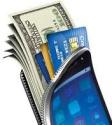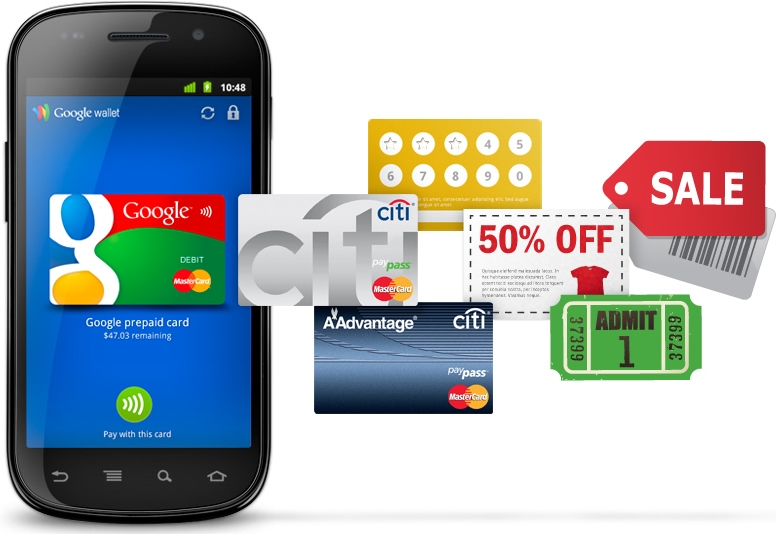Mobile Wallets - Hype Or The Real Thing?!
Are mobile wallets real or wishful thinking?! The topic of digital wallets has been discussed for years, with projections of billions of dollars and all kinds of convenient and fancy features. So what is it, and is it still in the future, or is it already here? Here you'll find a discussion that should clear up confusion, and and answer questions that many people have asked me over the years.
What Are Mobile Wireless Wallets?
Interestingly, this is the most interesting question of them all! What defines a mobile (wireless) wallet is still largely debated, and, believe it or not, has no real generally accepted definition! Some will say that one, some, or all of the following are needed in the definition:
- It must be used to pay for things.
- It should store all of our payment information, including credit cards, debit cards, and bank information.
- It should store all of our loyalty cards.
- It needs to be able to pay for bills (ex. utilities, cable, cell phone, etc.).
- It should include technology that enables wireless payments at point of sale (ex. NFC = Near Field Communication).
- It needs to be highly secure.
- It needs to replace the need to carry a physical wallet.
Reviewing this list, I can see how coming up with a clear definition could get controversial to say the least. For me, I can keep it simple by saying that mobile wallets should include ALL of these features, whether or not people choose to use them. It should essentially allow me to leave my wallet at home, and yet still be able to transact using my phone for everyday transactions. Extended capabilities like paying bills obviously go beyond replacing a physical wallet, but are natural (I and dare I say, obvious) extensions of having payment information stored in an app on the phone, or in the cloud.
Do We Need It?
I like the idea of not having to carry around a bunch of cards. I already try to minimize carrying around cash so I can charge everything to get points on my credit cards, however, eliminating physical cash and pesky coins altogether sounds
 very
appealing. Is it
a big deal to carry around a wallet; if you're organized, I'd say no,
not at all. Do I like the idea of having to ensure that my
phone always has enough battery power to transact, no; and quite
frankly, I can see the following pain points:
very
appealing. Is it
a big deal to carry around a wallet; if you're organized, I'd say no,
not at all. Do I like the idea of having to ensure that my
phone always has enough battery power to transact, no; and quite
frankly, I can see the following pain points:- Battery life anxiety (like range anxiety for electric cars) would become a new term, based on a real stress point.
- I can envision being in line at Costco, trying to pry my phone out of my kid's hands to process a payment, and the ensuing tantrum that was never an issue when I had my old-school wallet.
- I keep a backup credit card in my car for emergencies. If the entire payment infrastructure moved to mobile wallets, what would I do if I left my phone at home, or it was lost, stolen, or broken? There would forever need to be some degree of legacy system support, which would mean that complete elimination of existing payment mechanisms could conceptually never be eliminated. Perhaps an in-store terminal that I could login to to access my mobile wallet could be a solution? Or perhaps tying everything to a biometrics scan (fingerprint or eye scan)?
Do mobile wallets solve a problem like most great products do? That's debatable. Sure, I could see a number of conveniences, however, largely, it's kind of like the iPad. Did the iPad (or any tablet) really solve a problem people were having? Nope. Does it do anything that much better than any other device we have access to; not really. Do millions upon millions of people love iPads and other tablets, and have made them a part of our daily lives? Yup.

So what's the driving force behind the mobile wallet? This is simple. It's wireless carriers, banks, and other providers looking for new revenue models, and new features to keep customers with them. It's also dozens, if not hundreds, of entrepreneurs drooling over the thought of the next big thing that they can sell to PayPal, Google, Microsoft, Amazon, or other massive companies. So no doubt we will continue to see mobile wallets being pushed by every entity with which we interact!
One massive driving force behind mobile wallets is actually the desire by large retailers to avoid paying transaction fees to the likes of Visa, MasterCard, and American Express. Much of the mobile payment infrastructure was devised based on circumventing these entities in order to save money by avoiding these fees. Any company or product that can offer an alternative payment process is a welcome option!
How Do Prepaid Debit Cards Fit In?
Many mobile wallet applications currently on the market are nothing more than Prepaid Debit cards that are tied to virtual bank accounts, and a mobile application on our phone. In other words, they've taken the prepaid reloadable debit card concept of more than a decade ago, added bill pay and check image deposit features, and sold it to carriers as mobile wallets! That's not to say that's a bad thing, but let's keep things real and not try to sell people that this is something new and innovative; people are smarter than that.
Who Are Some Players?
Here's a list of mobile wallet-like products, some of which get closer to what we might see as a virtual wallet, and others that seem like standalone storage apps.
* PayPal Mobile
* Android Pay (previously Google Wallet)
* Samsung Pay (acquired SoftCard, previously Isis)
* Apple Pay
 There are no doubt other companies trying to get in the game.
Apple was surely the one that injected customer awareness and
legitimacy when it introduced Apple Pay, even though, for the most
part, they simply took what Google was already going with Google
Wallet, and expanded on that. If nothing else, leveraging the
Apple brand has provided a fantastic lift in overall awareness and
penetration of mobile payments.
There are no doubt other companies trying to get in the game.
Apple was surely the one that injected customer awareness and
legitimacy when it introduced Apple Pay, even though, for the most
part, they simply took what Google was already going with Google
Wallet, and expanded on that. If nothing else, leveraging the
Apple brand has provided a fantastic lift in overall awareness and
penetration of mobile payments.What About SMS?
There's been a lot of talk about companies, as well as countries, making use of SMS to process payments. Many wireless carriers use it to allow you to make payments using a credit card, debit card, or bank account on file. And some companies/countries allow users to make purchases and pay bills using SMS. The great thing about SMS is that it works on any phone. It doesn't require a special application on your phone, or embedded technology in your phone or at the point of sale like NFC. Some would even argue that building out SMS capability could be considered a competitor to what people are generally leaning towards as mobile wallet applications. That said, the momentum of NFC payments is likely to continue, and SMS payments will likely continue to be used for only very specific targeted purposes.
So What Does The Future Hold?
There's no doubt that as a society we're going to move away from cash, and we need a slicker means of dealing with the cards in our wallet. It seems obvious that NFC payments will win out, despite its slow start. However, rest assured that it will be 5-10 years before we see any truly transformational usage. In the meantime, I'll be keeping my eye on this market and technology, so please check back for updates!
Home
›
Adding Money
›
Mobile Wallets
| Be Heard! Let prepaid wireless providers know what you want; fill out the survey now. |



Comments
Have your say about what you just read! Leave a comment in the box below.